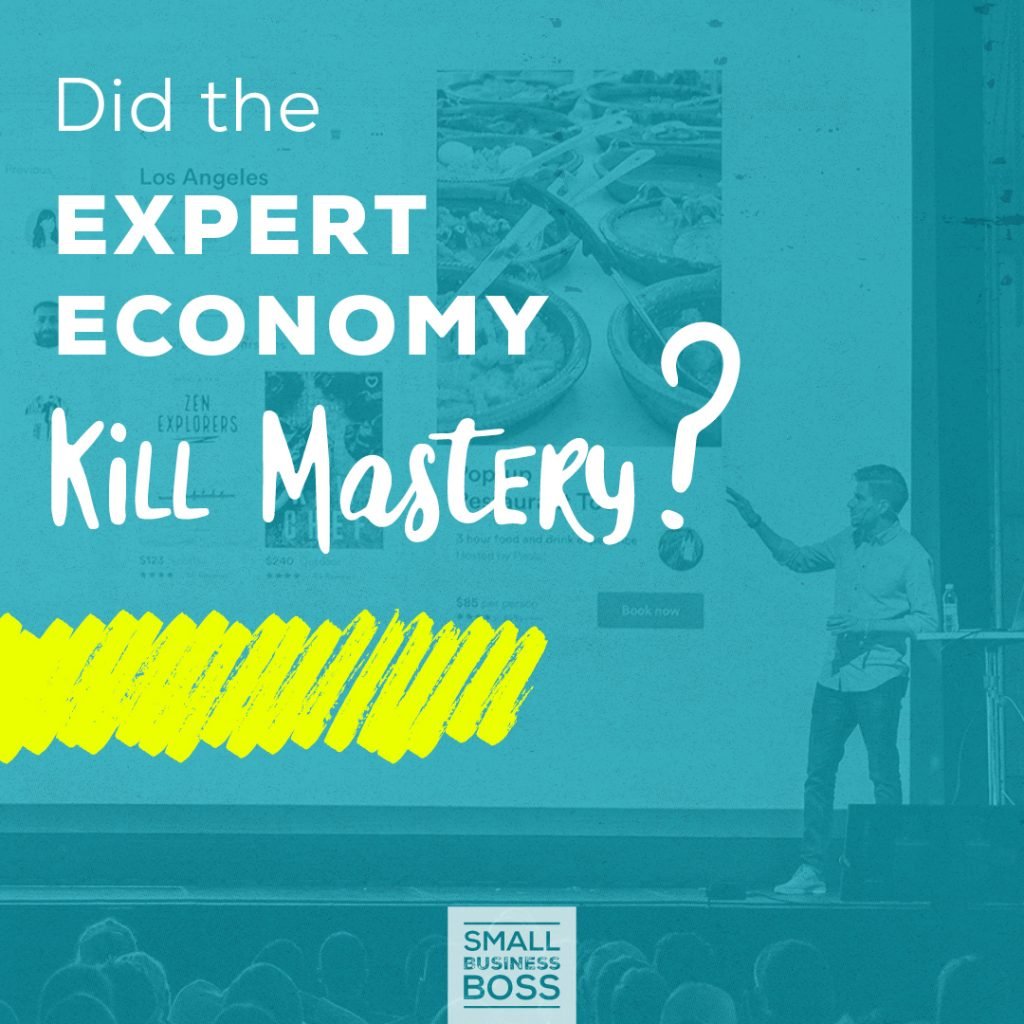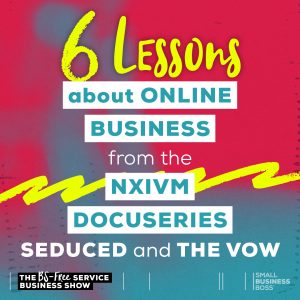
Search the site:
Did the Expert Economy Kill Mastery?
Back in 2013, my family went on a road trip to Prince Edward Island, and somewhere in the middle of rural Quebec, I threw my Kindle across the backseat.
Why? I was reading a book about the expert economy, and I was completely enraged by the message.
It was a story that’s all too common in the online business world about how if you know something, you should teach it. That you just needed to know more about it than your audience. No training, experience or other qualifications needed to be well on your way to being a millionaire.
Honestly, I want to throat punch the person who wrote this book to this day. (Please know, I’m not typically violent, but as a pro at what I do, this is so @#$@#$@ annoying.)
This “teach what you know” concept is at the heart of the expert economy in the online business world. And in many ways, it’s a major problem because it’s killed off mastery in the process.
Call me old school, but I deeply believe that we need to invest time in mastering what we do before we teach it.
Maybe we don’t need 10,000 hours, but ethically, we need a hell of a lot more than 10 or 50 hours. We owe our students and communities better because when we teach without mastery, the only person we’re serving is ourselves.
The truth is, without mastery, we’re not teaching from a place of service but one motivated by putting money into our bank accounts. (And while I’m all for making money, it’s never at the expense of integrity.)
What Mastery Really Is
When I talk about mastery, I’m not talking about the fact you need to have a specific degree or qualification or a zillion years of experience. At the core of true mastery is having applied your knowledge in multiple scenarios and situations and possess the ability to think critically about all possible angles.
As an example, let’s say you hire a PR person who’s just gotten some good PR for themselves a couple of times and has now decided they’re a pro. What happens when things go bad? When you get a bad piece of press, or worse yet, a crisis occurs?
They’re not going to be able to help you.
What if this self-styled PR pro is teaching a course, and what they’re sharing aren’t even industry standards, and you actually do damage to your brand thanks to what they taught you?
That’s what happens when mastery is lacking. We get shortchanged by someone who’s not seasoned enough to know better.
Why Mastery Matters
We live in uncertain times, and not to be dramatic, but I’m not willing to play fast and loose with my business by getting guidance from someone who’s lacking mastery.
Obviously, you can choose who you work with, but you work hard for your money, and I want you to keep that money in your pocket. I see far too many business owners who aren’t making the money they should be because they’re constantly being sucked in by those lacking mastery.
To those of you who’ve been sucked in by sketchy experts, please don’t feel bad. This isn’t worth dwelling on; it’s a valuable lesson on how you should insist on mastery from the people you spend your money on.
I know because I’ve been there. I have personally been sucked in so many times, and there’s no shame in it. (I talked about my common sense and intuition being short-circuited in this post.)
The question then is: How do we know who has mastery and how do we avoid being hoodwinked?
There are numerous ways to cut through this BS, so let’s walk through them.
Watch for people that call themselves a guru, ninja, or some other dudebro term.
That’s a tell-tale sign they’re full of it — or at least a sign that they’re kind of the worst.
Practice discernment.
If something seems too good to be true, it probably is. Listen to the little voice in your head that knows better.
Do the math.
If someone is 25 and has 10 years of experience in the market, something is very likely up. If their story seems convoluted or too good to be true, trust your gut.
Watch and learn.
The worst experiences I’ve had with a lack of mastery were the direct result of impulse purchases. When you spend time observing and interacting with someone for months (or even years) before you invest a cent, you’ll get a good handle on what they’re really all about. Then you can budget accordingly.
Dig into their backstory.
Figure out how they ended up teaching this thing. If sleeping on a sister’s couch or becoming an accidental teacher are involved, please put away your credit card.
The latest overnight sensation.
Beware the overnight sensation who comes out of nowhere and suddenly you see EVERYWHERE. They usually have a story that’s dramatic and their meteoric rise usually involves hitting a big revenue goal. They’re all sizzle, no steak and they quickly move on to something else after the excitement fades.
Ask questions.
Someone who’s got nothing to hide will want you to ask all the questions. In fact, they’ll expect and encourage it. If you’re not sure, keep asking and watch for answers that seem manipulative or a little too slick.
Where Mastery Lies
Enough with the doom and gloom. Now that you know what to avoid, look for these criteria instead.
First, they’re honest about their story, and they don’t claim to have all the answers. They’re willing to share their experience and aim to cultivate a conversation.
My favorite example of this is Tara McMullin from the What Works Network. What I appreciate about Tara is that she’s honest and isn’t here to be anyone’s expert. She’s completely committed to facilitating a conversation with small business owners about what works for them. She recently broke this down in a post I couldn’t love more.
Another key indicator of mastery is that they’re a service provider who’s done this with 100s of clients and what they teach isn’t theory, but has been put into practice over and over again.
A service business is hands down one of the best ways to create a signature process that translates into something that can be taught. Best of all, you know that if someone is STILL working with clients, they’re seeing how things are evolving in real-time and there will be the wiggle room needed to adapt the service to your specific way of showing up in the world.
Hailey Dale from Your Content Empire is an incredible example of this in action. She works with clients on their funnels and content marketing and also has a signature course based on that experience. What I appreciate about Hailey is that she uses her experience to help her clients implement an approach to content that’s adapted to their business while using her framework. (Because processes and frameworks are great – but not if they’re completely one-size-fits-all and jam everyone’s business into a rigid way of doing things.)
Personally, I’ve been eagerly awaiting a market correction in the online business world where those with true mastery will be left standing. Where those that aren’t hiding behind layers of faux expertise aren’t able to sell us the next big thing.
In the meantime, it’s up to each one of us to do our homework and to not be sucked in by people who’ve built a business on teaching things they have absolutely no business teaching in the first place. Harsh? Maybe! But there are so many amazing people out there that are intentional and deliver with integrity, that we don’t need to settle for anything less.

I’m Maggie Patterson (she/her), and services businesses are my business.
I have 20+ years of experience with client services, am a consultant for agency owners, creatives, and consultants, and vocal advocate for humane business practices rooted in empathy, respect, and trust.
Read or Listen to the Latest
For Solo Business Owners

Growing a solo service business is tough.
It’s even harder when you’re bombarded with BS advice that steers you away from your values and why you started your business in the first place.
This is the podcast for solo creatives and consultants who want to remain as a team of one and have zero interest in the hustle and grind of typical business teachings.
Subscribe now and never miss an episode.
For Micro Agency Owners
Most podcasts for agency owners obsess over revenue growth as the ultimate success metric.

But here’s the truth: not everyone wants to make millions. Your goal might be to build a sustainable business that lets you have a life and doesn’t run you into the ground.
Join me as I spill my shameless confessions and share everything I’ve learned about building a micro agency that skips the BS of tired and typical agency teachings.
Follow Now on All Major Podcast Platforms








